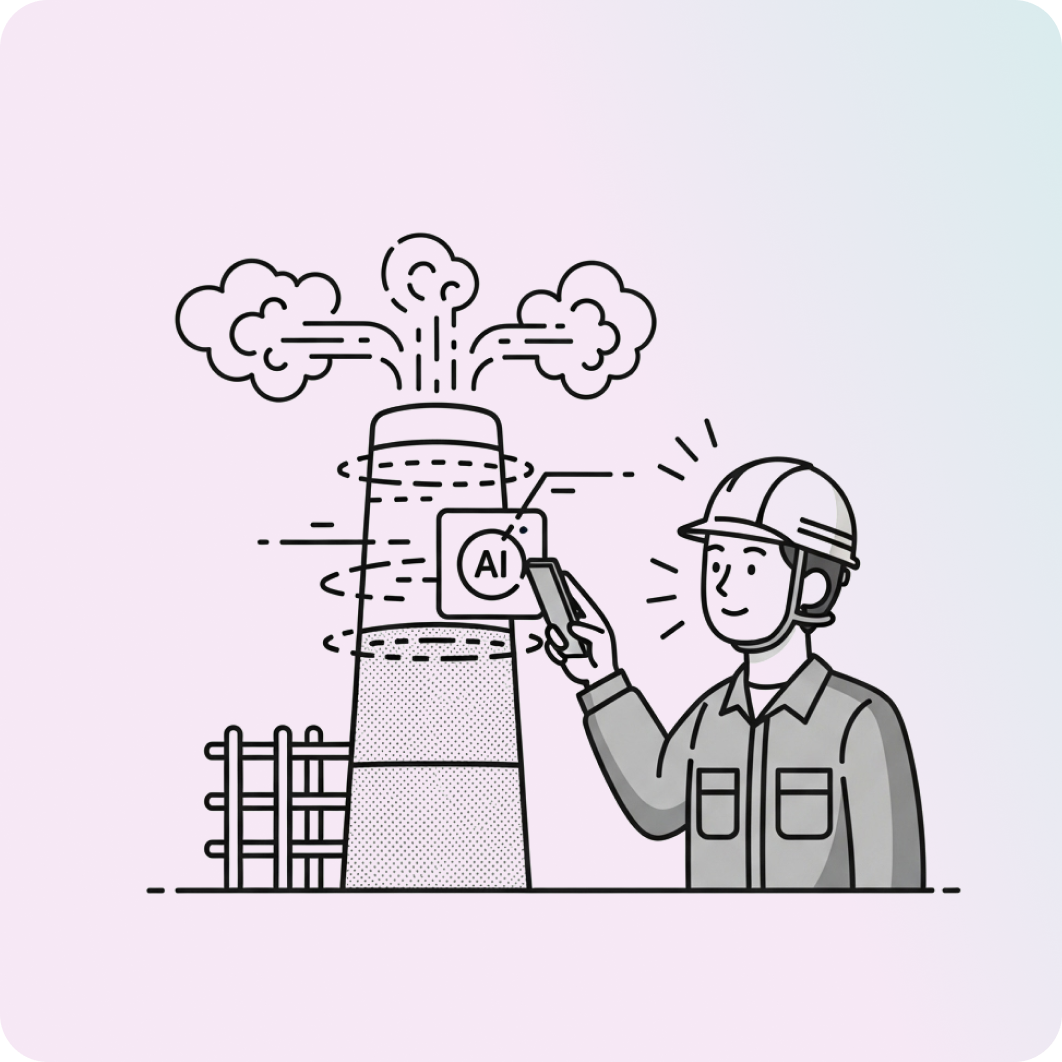Oil, gas, and petrochemical companies are preparing for the future by expanding their product range within existing business areas or diversifying into new energy and materials sectors to ensure sustainable growth. At the same time, they are increasing the adoption and investment in new technologies such as AI, digital solutions, and robotics to improve plant operational efficiency and profitability.
With global carbon regulations tightening, companies are accelerating efforts to develop carbon-reduction processes, create eco-friendly technologies, and shift toward sustainable alternative energies such as renewable energy and biofuels. Recognizing that safety incidents directly impact financial performance, the importance of safety management is also gaining more attention in both technological and management innovation.

Digitalization of Manufacturing Processes
To maximize production efficiency, maintain consistent quality, and effectively respond to industry standards and regulations, oil, gas, and petrochemical companies need standardization and integration of manufacturing and production change data, along with real-time monitoring.
Digitalizing manufacturing processes using AI and big data shortens the planning cycle through market analysis, automated design, and virtual simulation. It also drives process innovation across core production systems such as master data, production planning, ERP, MES, and DW.
Global chemical company C worked with LG CNS to build a global MES that standardized dispersed production sites and system data. By integrating the entire process from production planning to shipment through a graphics-based interface, the company now operates a stable, data- and system-driven production and quality management system.

Plant Operations Optimization
To improve the efficiency of plant operations, oil, gas, and petrochemical companies need to analyze vast amounts of production process and equipment data to address inefficiencies and minimize operator intervention, thereby driving innovation that maximizes productivity and cost efficiency.
To optimize operations at oil, gas, and petrochemical plants, AI- and digital twin-based platforms are used to simulate and validate processes virtually, helping identify optimal operating conditions. In addition, troubleshooting features powered by generative AI support swift responses when issues arise.
Oil company E and petrochemical company A have adopted LG CNS’s Intelligent Operation Platform to implement integrated, data-based process monitoring, troubleshooting, and AI optimization. By applying these capabilities directly to actual operations, they have secured opportunities for process optimization and continuous profit improvement.
In addition, they introduced AI-powered Flare Stack Optimization, which combines AI vision with control system integration to enhance steam control for flare stacks, previously managed manually and visually. This has significantly reduced risks and drastically cut steam costs.

AI-Powered EHS and Regulatory Compliance
In the oil, gas, and petrochemical industry, complying with safety and environmental laws and regulations is more than just a legal obligation. A company’s level of safety and environmental management is increasingly seen as a key competitive strength, reflecting its commitment to employee protection and social responsibility.
AI-powered integrated EHS control, the Process Safety Knowledge Hub, and AI Risk Assessment help predict and prevent on-site accidents in advance, enhance employees’ safety performance, and support efficient compliance with various regulations.
Petrochemical company E and oil company S adopted LG CNS’s generative AI-based PSM (Process Safety Management) Interview Skill-up solution, enabling continuous interview practice with AI. This reduced the time and cost needed to prepare for safety interviews while naturally raising employee safety awareness.
They also implemented an integrated EHS control system that collects field data in real time and performs AI-based risk analysis, allowing early prediction and prevention of potential incidents. In the event of an accident, the system enables rapid information sharing and response guidance, securing a 24-hour control framework that ensures timely action during critical moments.

Development and Application of Industry-Specific AI Services
Effectively leveraging industrial AI requires the ability to identify applicable tasks and a deep understanding of field-level data. Accordingly, two capabilities are becoming critical: an AX environment that enables employees to execute AI initiatives easily and efficiently, and industry-specific AI services that drive measurable outcomes.
To empower employees to apply domain expertise to field data and independently execute AI initiatives, a comprehensive generative AI platform is essential—incorporating generative AI, ML/DL, and a Data/Knowledge Lake.
By implementing the LG CNS generative AI platform, chemical and energy company K gained the ability to identify and develop AI use cases across both routine and field-centric tasks—from daily tasks such as information search and translation to field-level work like yield analysis, quality control, and process optimization. The company also established an AX environment that allows any employee to apply AI to relevant tasks, enhancing AX capabilities enterprise-wide.

ESG Management
Climate and environmental challenges are placing increasing sustainability demands on oil refining and chemical companies, and ESG management has become a core driver of corporate competitiveness.
An AI- and big data-based ESG and carbon management platform enables accurate, reliable ESG goal management and the formulation of effective strategies.
L Group and M Chemical Company utilize LG CNS’s ESG platform to automatically aggregate large volumes of ESG data, manage performance and risks by indicator, disclose outcomes backed by concrete data, and devise data-driven strategies. Additionally, by implementing a product-level carbon footprint system built on master data, they improve data accuracy and reliability, effectively manage direct and indirect emissions, and enhance the efficiency of ESG-related operations.



